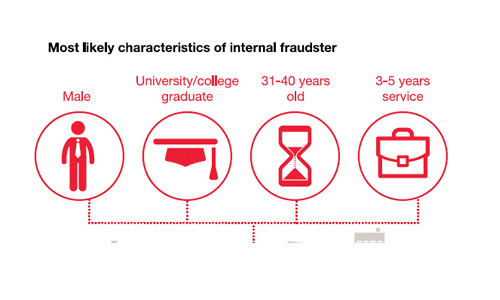‘Opportunity’ often leads to economic offences: Survey
Manama : Opportunities to commit fraud in large companies are seen as a major reason for economic offences in Middle East, according to a recent survey.
Majority of respondents to the survey conducted by PwC, a consulting firm, cited “opportunity” as the biggest factor driving economic crimes committed by employees.
Hence, addressing the ‘opportunity’ factor in organisations has a greater effect on reducing the level of economic crimes, says the consulting group. A quarter of Middle East respondents’ companies have never performed fraud risk assessment, the survey revealed. “The challenge for businesses then, is to close down the opportunities to commit economic crime. Part of this is about keeping up-to-date on new threats and new ways to prevent, detect and respond effectively to those threats. “
Economic crime is a risk that is hard to unseat, the report notes.
“Constantly evolving and seeking new forms, it requires constant vigilance from the Boardroom via the C-suite to middle management and the shop floor. But some Middle Eastern organisations have perhaps adopted a one-time; one solution approach to this challenge which is reactive, irregular and inconsistent. Unfortunately this is like cutting the head off a hydra. Others quickly grow back. The battle to combat economic crime is not so easily won,” it says.
Organisations in the region can also tend to rely heavily on buying in IT or controls systems, with the assumption that this has ‘fixed the problem’. But technology alone is never enough, and needs to be supported by competent and trained teams to operate it, according to PwC.
Globally, there is a big disconnect between what is actually happening and what top management believes is happening. But, in Middle East this disconnect is much wider resulting in reduced amount of scrutiny on employees.
This may explain why the region stands out with more fraudsters in middle management (29 pc) or a junior role (46pc), with three to five years’ service against the global trend towards more involvement by senior employees, the report observes.
The survey results say that 26 pc of respondents in the Middle East indicated that their organisations reported economic crimes in the last 24 months.
“This is lower than the global average of 36 pc. While the reported number of affected organisations in the Middle East was lower, the number in the region, who simply didn’t know if they’d been a victim, was much higher than the global average,” it explains.
“This is a cause for alarm, and points to a serious lack of trust by executives in their systems to identify economic crime as it occurs,” PwC
notes.
The biggest factor in driving economic crimes committed by employees: PwC
Related Posts


